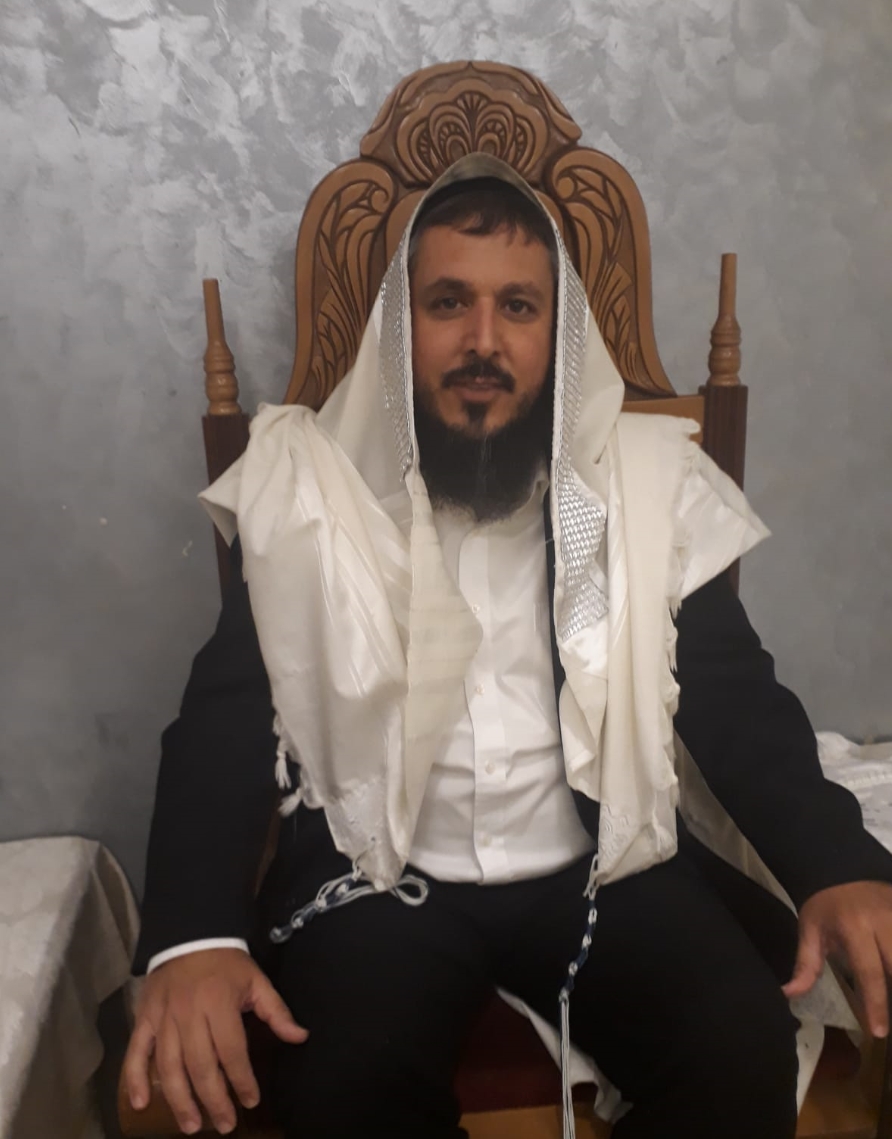How Is a Wedding Ceremony Conducted in Sign Language? Meet the Rabbi Making Judaism Accessible to the Deaf
Rabbi David Ruimi is dedicated to making Judaism accessible to the deaf and hard of hearing. He teaches Torah classes, officiates weddings, and guides Bar Mitzvah boys in sign language. What is the one thing you should never do to the deaf?
 Rabbi David Ruimi (Photo: Personal Album)
Rabbi David Ruimi (Photo: Personal Album)"Growing up in a household where both parents were deaf was challenging," acknowledges Rabbi Ruimi (49), the eldest of three siblings. "From a very young age, I had to run with them to the bank or translate what the teacher said during parent-teacher meetings. I was doing things a child wasn't supposed to do. A child should enjoy playing games, and I was like the head of the household. I had to take them everywhere and translate what was being said in sign language."
As an example of a child maturing early, Rabbi Ruimi recalls that during the Yom Kippur War, he instructed his parents when to head to the shelters. "Still, while my parents couldn't hear, they were gifted in other ways—they are very smart and sharp, and their sense of taste is quite strong. It's a form of compensation for the loss of hearing," he emphasizes.
"In the past, there was no accessibility or awareness of the deaf community, and society wasn't always patient. During childhood, many laughed at me. When I arrived at social forums with my parents, children would gather around to see how we communicated in sign language. It sparked quite a bit of curiosity, which made me very embarrassed. I would cry to Hashem and ask, 'Why was I born to deaf parents?' Eventually, I understood it was my destiny to help the deaf world. Today, I'm happy and proud of both my parents. They are also very proud of the enterprise I've established."
In his work for the deaf, Rabbi Ruimi sees a way to rectify his difficult childhood experiences. "Making Judaism accessible to the deaf is my mission. I've studied Torah diligently for ten years. After that, I paved the way on this subject. I'm one of the active rabbis with the Shemaiah organization, responsible for the children's and adults department. I run different projects, Bar Mitzvahs, weddings, trips to the graves of righteous individuals, and more.
Travels from City to City, Teaching Torah in Sign Language
"Since becoming active in this field, I've pioneered Torah study for the deaf, which I translate simultaneously. I don't stay in one place, but move from city to city, reaching out to the deaf and showing them what Judaism is about. I'm making the world of Torah accessible, and with Hashem's help, we're seeing the fruits of this work."
Rabbi Ruimi delivers a Torah lesson in sign language. Watch:
Rabbi Ruimi clarifies: "It's important to know that a deaf person is not exempt from the world of mitzvot. Maran Rabbi Ovadia Yosef, of blessed memory, wrote in 'Yabia Omer' and other responsa that deaf people enrolled in school settings are certainly not exempt from mitzvot. True, there are laws such as shofar blowing or ritual slaughter that they are indeed exempt from. But they are certainly obligated to observe Shabbat, for example."
One of Rabbi Ruimi's achievements involves marriage, notably ensuring a standard ketubah is used, meaning the couple's deafness is not mentioned. Additionally, he conducts the chuppah like any other: the couple may not hear, but the wedding song plays nevertheless, with an interpreter visually demonstrating and conveying the song's meaning.
"It pained me that they felt like second-class citizens, unlike others who hear," he shares. "When approached, I would assure them, 'Don't worry, with Hashem's help, we'll ensure that all councils and rabbinates in Israel prepare regular ketubahs. We'll change this reality.' It's important to understand these individuals are businesspeople, university students, functioning normally in every area of life—so why shouldn't they get married like everyone else?!"
The fight for a standard ketubah succeeded. "Indeed we've succeeded, and the mention of deafness is no longer included in the ketubah as in the past. They receive a regular ketubah from all rabbinates in Israel. This is a significant achievement for us, as they feel they belong to the hearing world, part of us. Naturally, we did everything under halachic supervision."
Rabbi Ruimi doesn't stop there. About two months before the chuppah, he meets the groom and offers bridegroom instruction. He also reviews the specifics of the chuppah with the groom. "I make him understand and repeat many times the phrase, 'You are hereby consecrated to me with this ring according to the laws of Moshe and Israel.' It's vital that he says this sentence because only then can the bride understand what he's saying, ensuring the wedding and consecration are conducted properly. Even though there is an interpreter, the groom knows what he's saying. I demonstrate and prepare him long in advance. We've made the chuppah accessible for them. And certainly—just as hearing individuals receive groom and bride instruction, so too are the deaf community entitled."
As mentioned, Ruimi uses his hands to translate the chuppah simultaneously into sign language. For this purpose, he uses a headset with a microphone ('Madonna'). "Both hearing and deaf people are moved. I translate the chuppah simultaneously. It's challenging, but when you train your mind to do two actions at once, it's possible. Even the audience finds it emotional. They become part of the experience; I also make jokes beforehand, so the groom and bride laugh too. They get into the atmosphere. I come with a microphone because I speak to them in sign language; I need to show my hands and my lips, speaking slowly. The equipment is connected to amplification, and the entire audience, including the guests, hears me and understands me in sign language."
One of the cases that touched his heart was a couple in their 60s who married for the second time: "They cried and were moved during the chuppah I conducted for them, explaining that in their youth, at their first marriage, they had no idea what they were getting into. However, during their second wedding, now in their sixties, everything was clear."
Deaf Children Reading from the Torah
Rabbi Ruimi also makes Torah reading before a Bar Mitzvah accessible: "For two entire months, I teach the Bar Mitzvah boy his weekly Torah portion. I usually organize a ceremony at the Western Wall, with volunteers drumming and leading them to the Wall with music. The Bar Mitzvah boy knows the portion and how to put on tefillin. I let him feel that this day is all his own. He goes up to the Torah, thus developing a desire to connect with the Torah. He doesn't put on tefillin just for pictures. There are children with hearing devices, whom I teach with the correct pronunciation. I had a Bar Mitzvah where the parents wept with deep emotion. Everyone saw the groom's struggle to say the portion word by word. It was very moving.

Rabbi Ruimi shares a message: "The hearing public needs to show more respect towards the deaf, to make services and Judaism more accessible and, for instance, allow them to say Kaddish. This way, they will feel more connected to the hearing. We need to embrace this public, understand their world. They are not going to become rabbis or cantors, but we should allow them to be part of a minyan, and by the way, they do indeed join the minyan. What we must not do is pity them; we must relate to them on equal footing. There are deaf people who are business owners; they work and lead normal lives. They don't need pity; they are like the hearing."
Indeed, Rabbi Ruimi has a dream: "My mission is to make Judaism accessible to the deaf, to arrange weddings, Bar Mitzvahs, and to dispel stereotypes. My next goal is to see a certified deaf rabbi. That would herald the coming of the Messiah."

